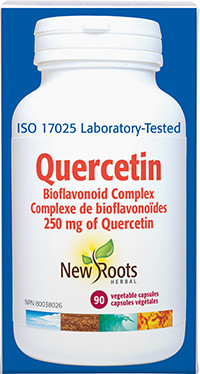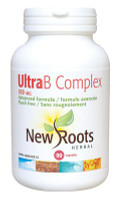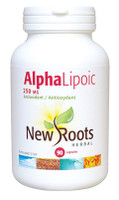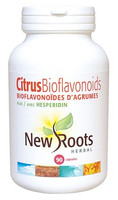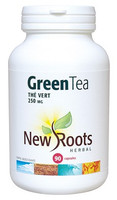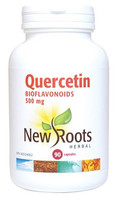- Home
- Health Condition
- Allergies
- New Roots Quercetin Bioflavonoid Complex 250 mg, 90 Capsules
New Roots Quercetin Bioflavonoid Complex 250 mg, 90 Capsules
Product Description
This complex contains quercetin, bromelain, and rutin, that scavenge oxygen radicals, inhibit xanthine oxidase, and inhibit lipid peroxidation.
Ingredients
| Each vegetable capsule contains: | |
| Quercetin | 250 mg |
| Citrus bioflavonoids (50% hesperidins) | 250 mg |
| Bromelain (Ananas comosus), 2400 GDU/g [1,800,000 FCC PU] | 50 mg |
| Rutin | 50 mg |
Suggested Use
Detailed Description
Quercetin is widely distributed in the plant kingdom and is the most abundant of the flavonoid molecules. It is found in many often-consumed foods including apples, onions, tea, berries, and brassica-type vegetables, as well as many seeds, nuts, flowers, barks, and leaves. It is also found in medicinal botanicals, including Ginkgo biloba,Hypericum perforatum (St. John’s wort), Sambucus canadensis (elder), and many others. It is often a major component of the medicinal activity of the plant, and has been shown in experimental studies to have numerous effects on the body. All flavonoids have the same basic chemical structure, a three-ringed molecule with hydroxyl (OH) groups attached. A multitude of other substitutions can occur, giving rise to the many types of flavonoids. Flavonoids often occur in foods as a glycoside, meaning they have a sugar molecule (rhamnose, glucose, galactose, etc.) attached to the center ring.
Quercetin is the aglycone (meaning minus the sugar molecule) of a number of other flavonoids, including rutin, quercetin, isoquercetin, and hyperoside. Quercetin appears to have many beneficial effects on human health, including cardiovascular protection, anticancer activity, antiulcer effects, antiallergy activity, cataract prevention, antiviral activity, and anti-inflammatory effects. Flavonoids, as a rule, are antioxidants, and a number of quercetin’s effects appear to be due to its antioxidant activity.
Quercetin scavenges oxygen radicals, inhibits xanthine oxidase, and inhibits lipid peroxidation in vitro. As another indicator of its antioxidant effects, quercetin inhibits oxidation of LDL-cholesterol in vitro, probably by inhibiting LDL oxidation itself, by protecting vitamin E in LDL from being oxidized or by regenerating oxidized vitamin E. By itself, and paired with ascorbic acid, quercetin reduced the incidence of oxidative damage to neurovasculature structures in skin, and inhibited damage to neurons caused by experimental glutathione depletion. Flavonoids, particularly quercetin, are inhibitors of allergic (IgE-mediated) mediator release from mast cells and basophils. In reported laboratory studies, quercetin inhibited not only IgE-mediated allergic mediator release from mast cells but also IgG-mediated histamine and SRS-A (peptidoleukotriene). Interestingly, quercetin was much more potent as an inhibitor of the release of SRS-A than histamine, suggesting that it might also inhibit the biosynthesis ofSRS-A. Subsequently, it was demonstrated that quercetin was an effective inhibitor of 5-lipoxygenase; this property of the compound most likely accounts for its effect on peptidoleukotriene biosynthesis.
Quercetin is indicated in any inflammatory condition, as it inhibits the formation of the inflammatory mediators prostaglandins and leukotrienes, as well as histamine release. This may be especially helpful in asthma, as leukotriene B4 is a potent bronchial constrictor. Quercetin’s inhibition of xanthine oxidase decreases the formation of uric acid, and thus it may be of value in the treatment of gout. Animal studies have shown quercetin to be protective of gastric ulceration caused by ethanol, by inhibiting lipid peroxidation of gastric cells and/or by inhibition of gastric acid secretion. An interesting aspect of quercetin’s antiulcer effect is that it has been shown to inhibit the growth of Helicobacter pylori in a dose-dependent manner in vitro.
Bromelain is found mostly in the stems of pineapples and is available through extraction as a dietary supplement.
What is it? Bromelain is a group of proteolytic enzymes that are essential for digesting protein. Although most enzymes are considered to be poorly absorbed, the body can absorb significant amounts of bromelain. People who suffer from malabsorption usually use proteolytic type enzymes to help with their ailment.
Bromelain can prevent excessive blood platelet stickiness because it is a natural blood thinner. Through the positive reports in clinical trials, bromelain was shown to decrease symptoms of angina and thrombophlebitis. In addition, bromelain reduces the thickness of mucus, which can benefit patients with asthma or chronic bronchitis.
How does it work? Bromelain is a natural anti-inflammatory enzyme that works by breaking down fibrin, a blood-clotting protein that can impede good circulation and prevent tissues from properly draining. Bromelain is used particularly with strains, muscle injuries, pain, swelling, and tenderness that accompany sports injuries. Bromelain also blocks the production of compounds that can cause swelling and pain. When inflammation is minimized, blood can flow easily to a damaged area, easing pain and speeding up the healing process. Because of its anti-inflammatory effects, bromelain has been found to significantly reduce postoperative swelling. Research has also found that bromelain has an effect in reducing swelling, bruising, and pain for women having minor surgery after they have given birth (episiotomy).
Bromelain is often blended with trypsin, an enzyme that alleviates symptoms of urinary tract infection due to its anti-inflammatory action. Research comparing the two enzymes in combination with antibiotics to placebo plus antibiotics reported that reductions of symptoms were good to excellent with all of the patients given these enzymes and antibiotics. Bromelain can also increase the uptake of bioflavonoids.
Rutin has strong antioxidant properties. Rutin can also chelate metal ions, such as iron, thereby reducing the Fenton reaction (production of damaging oxygen radicals). Rutin also seems to stabilize vitamin C. If rutin is taken together with vitamin C, the activity of ascorbic acid will be intensified. Rutin is important because it strengthens capillaries and can help people who bruise or bleed easily. Studies have demonstrated that rutin can help to stop venous edema, that is an early sign of chronic venous disease of the leg. Rutin has anti-inflammatory effects. Animal studies have shown that rutin has preventive and healing effects. There are indications that rutin can inhibit some cancerous and precancerous conditions. Rutin may help to prevent atherogenesis and reduce the cytotoxicity of oxidized LDL-cholesterol.
 Loading... Please wait...
Loading... Please wait...
